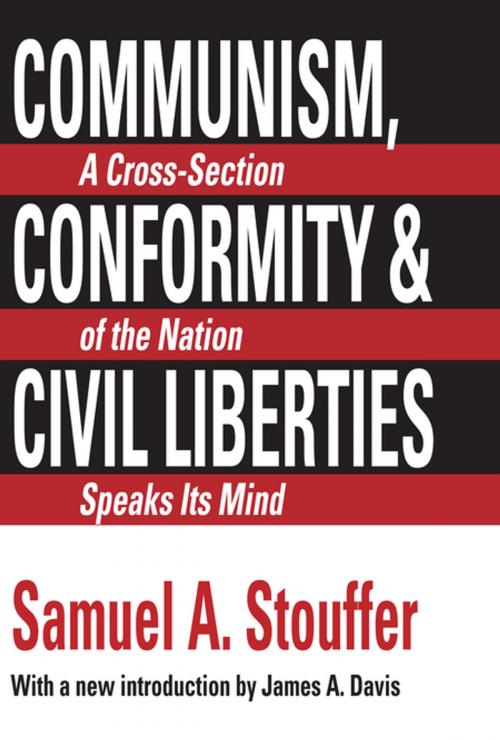Communism, Conformity and Liberties
Nonfiction, Social & Cultural Studies, Political Science, Politics, Practical Politics| Author: | Ferdinand Tonnies | ISBN: | 9781351527460 |
| Publisher: | Taylor and Francis | Publication: | July 12, 2017 |
| Imprint: | Routledge | Language: | English |
| Author: | Ferdinand Tonnies |
| ISBN: | 9781351527460 |
| Publisher: | Taylor and Francis |
| Publication: | July 12, 2017 |
| Imprint: | Routledge |
| Language: | English |
If there is a-"desert island" book in the conduct of social research, it is arguably this book. Whether in terms of sociological structures or psychological nuances, Communism, Conformity, and Civil Liberties, originally published in 1955, is a recognized landmark. Stouffer helped strengthen the fundamental liberties of all Americans by showing dangerous consequences of efforts to thwart a perceived Communist conspiracy, including some of the very real liberties that can be destroyed in the process of a witch-hunt.
Stouffer explores attitudes of Americans against a backdrop of a history of intolerance that dates back to the Know-Nothing party before the Civil War and extending through the Ku Klux Klan after World War I. The overall results show a markedly strong relationship between perception of high national risk and personal intolerance of differences, and also the perception of threat and tolerance that operates as a predisposing tendency that affects judgments about specific political movements and events.
Stouffer enriches the sense and meaning of survey research by emphasizing patterns of percentages rather than actual amounts; survey craftsmanship; the use of paired sampling techniques to reduce problems of chance; the importance of completion rates in survey research work; the importance of interruptions during a questioning period; the choice of field workers in performing the surveys. The actual survey instruments are included as prepared by the National Opinion Research Center and the Gallup Organization. They remain a model for large-scale samples of this kind.
The beautiful, highly personal, introduction by James Davis places Stouffer in an appropriate academic and professional context. Stouffer was a great sociologist with two landmark efforts to his credit: The American Soldier and then Communism, Conformity and Civil Liberties. Professor Davis calls this "a great classic of empirical sociology." It is
If there is a-"desert island" book in the conduct of social research, it is arguably this book. Whether in terms of sociological structures or psychological nuances, Communism, Conformity, and Civil Liberties, originally published in 1955, is a recognized landmark. Stouffer helped strengthen the fundamental liberties of all Americans by showing dangerous consequences of efforts to thwart a perceived Communist conspiracy, including some of the very real liberties that can be destroyed in the process of a witch-hunt.
Stouffer explores attitudes of Americans against a backdrop of a history of intolerance that dates back to the Know-Nothing party before the Civil War and extending through the Ku Klux Klan after World War I. The overall results show a markedly strong relationship between perception of high national risk and personal intolerance of differences, and also the perception of threat and tolerance that operates as a predisposing tendency that affects judgments about specific political movements and events.
Stouffer enriches the sense and meaning of survey research by emphasizing patterns of percentages rather than actual amounts; survey craftsmanship; the use of paired sampling techniques to reduce problems of chance; the importance of completion rates in survey research work; the importance of interruptions during a questioning period; the choice of field workers in performing the surveys. The actual survey instruments are included as prepared by the National Opinion Research Center and the Gallup Organization. They remain a model for large-scale samples of this kind.
The beautiful, highly personal, introduction by James Davis places Stouffer in an appropriate academic and professional context. Stouffer was a great sociologist with two landmark efforts to his credit: The American Soldier and then Communism, Conformity and Civil Liberties. Professor Davis calls this "a great classic of empirical sociology." It is















